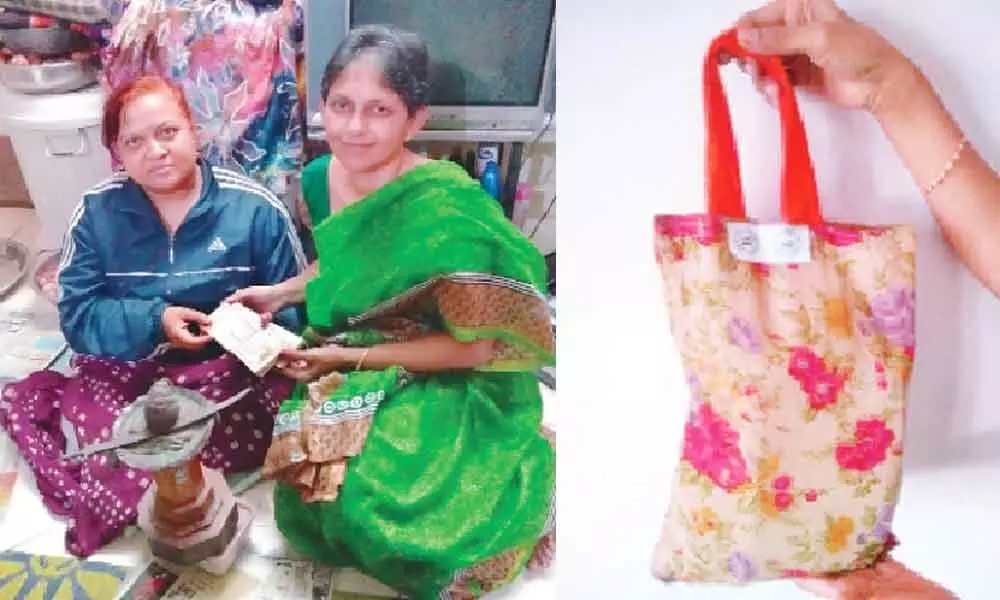Live
- They always want me to win, and now I feel lucky to have been offered a story like ‘Zebra’: Satyadev Kancharana
- ‘Democracy first, humanity first’: PM Modi in Guyana's parliament on two countries' similarities
- PKL Season 11: Telugu Titans register third straight win to top standings
- Is Pollution Contributing to Your COPD?
- NASA Unveils Underwater Robots for Exploring Jupiter's Moons
- Additional Central forces arrive in violence-hit Manipur
- AR Rahman and Saira Banu’s Divorce: Legal Insights into Common Issues in Bollywood Marriages
- 82.7 pc work completed in HPCL Rajasthan Refinery area: official
- Curfew relaxation extended in 5 Manipur districts on Friday
- Tab scam prompts Bengal govt to adopt caution over fund disbursement
Just In
Empowering women through sustainable initiatives


Hyderabad based 57-year-old J Rama works towards protection of the environment and also provides employment to many women by training them to be ‘Health Engineers’ engaging them in making cloth bags and sanitary napkins out of used sarees
Originally a soft skills trainer J Rama has dedicated herself to work towards the benefit of environment and provide hygiene for the underprivileged girls during their menstrual cycle.
With a concept of making use of old sarees into cloth bags and sanitary napkins, she trains and empowers women and encourages them to stand on their own feet by providing employment. She explains more about her work and how she wants to take it forward.
Tell us about yourself
Professionally, I am a soft skill trainer and I worked as an Assistant Professor in an engineering college. I am very much interested in social service and works that are oriented towards children.
Seven years back, on my 50th birthday, I thought of a plan where old used sarees could be made into bags and managed to make around 18 bags out of one saree. The idea came from a story I heard many years ago.
That was the beginning of 'Go Green' project to replace single use plastic bags with cloth bags. I took a decision of making one lakh bags and with three strong principals like never to buy the material, no bag is to go free of cost and the third was that all the bags should be made by women tailors. I stuck to these principals and now I was to complete my target.
What was the story that inspired you?
It was a story that inspired me when I heard it around ten years ago; of a teacher and a student. The student asks the teacher to give him his dhoti as it has become too old.
The teacher asks him, 'What are you going to do with the old dhoti?', and the student replies, 'I would use it as a blanket to cover myself while sleeping.'
Then the teacher asks him 'what will you do with the blanket that you are using now', to which, he says, 'I would use it as a rug at the door.'
On what he would do with the old rug, he says, he will make it into a curtain, and the old curtain, he would cut it into pieces and use them as wicks in the diya to light. Impressed by the student's answers, the teacher gets him a new dhoti.
The story gave me the idea to reuse old cloths to reduce waste and protect the environment. If people at home make bags out of sarees, and use them instead of plastic bags, it will significantly reduce the use of plastic.
What were the challenges initially?
Getting people to contribute old sarees for my project was a very big deal and sometimes when I got sarees, they wouldn't be strong to make a bag out of it.
A 70-year-old woman happened to call us to pick out some sarees. She wanted to give away her soft cotton sarees, which however, could not be made into bags. I did not feel like throwing them away and one fine day I got the idea of making sanitary napkins out of such sarees.
I washed them carefully and made them into napkins. It has been a difficult task throughout. One day a school for visually challenged girls approached us for doing something, and we gave them sanitary napkins.
One of the girls felt the softness of the cloth and hugged me, which made me very happy. That moment, I forgot all pain. Any material that is left with me is used for some good purpose.
Can you share any more good experiences on working on your project?
One day I had to complete the order of 20, 000 bags for Swarna Bharati trust, but then there were only 8 women tailors with me, which made wonder if I would be able to get the work done in such short span of time.
At that time there was a male tailor who approached me telling that he would take a rupee less and finish the order. But I stuck strong to my principle of working only with women.
On hearing about what had happened, the women tailors become very happy and completed the order before the deadline.

© 2024 Hyderabad Media House Limited/The Hans India. All rights reserved. Powered by hocalwire.com






